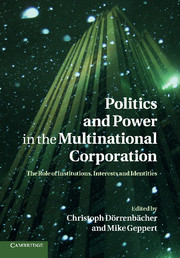 Politics and Power in the Multinational Corporation
Politics and Power in the Multinational Corporation Book contents
- Frontmatter
- Contents
- List of figures
- List of tables
- Notes on contributors
- Foreword
- Part I Introduction
- Part II Politics and power in MNCs: institutions, social embeddedness and knowledge
- 2 Resource dependence and construction, and macro- and micro-politics in transnational enterprises and alliances: the case of jet engine manufacturers in Germany
- 3 Bargained globalization: employment relations providing robust “tool kits” for socio-political strategizing in MNCs in Germany
- 4 Bridging roles, social skill and embedded knowing in multinational organizations
- Part III Politics and power in MNCs: headquarters–subsidiary relations
- Part IV Politics and power in MNCs: role of national identities and identity work
- Part V Conclusions
- Index
- References
2 - Resource dependence and construction, and macro- and micro-politics in transnational enterprises and alliances: the case of jet engine manufacturers in Germany
Published online by Cambridge University Press: 26 April 2011
- Frontmatter
- Contents
- List of figures
- List of tables
- Notes on contributors
- Foreword
- Part I Introduction
- Part II Politics and power in MNCs: institutions, social embeddedness and knowledge
- 2 Resource dependence and construction, and macro- and micro-politics in transnational enterprises and alliances: the case of jet engine manufacturers in Germany
- 3 Bargained globalization: employment relations providing robust “tool kits” for socio-political strategizing in MNCs in Germany
- 4 Bridging roles, social skill and embedded knowing in multinational organizations
- Part III Politics and power in MNCs: headquarters–subsidiary relations
- Part IV Politics and power in MNCs: role of national identities and identity work
- Part V Conclusions
- Index
- References
Summary
Introductory overview
We are concerned with the relative importance of different factors for the internationalization strategy and localization patterns in a highly globalized industry, with non-routine value creation and vertical integration or strong vertical alliances. To take a prime example for this situation, we investigated the evolution of two different multinational corporations (MNCs) developing and manufacturing jet engines in Germany. This study is embedded in an analysis of the jet engine industry and its worldwide development. Germany afforded a unique chance to study a combination of continuity and radical change in a high-technology industry. The business model of the industry is generally not known or appreciated, and it deviates remarkably from what is usually claimed for high-technology industries and for Anglo-American business systems. Furthermore, whilst the product and its supply are truly global, local influences are strong on the resource side, and a combined balance of resources affects localization decisions within the wider strategy of an enterprise. The strength of globalization, together with the interdependency between sites across borders, leverages the importance of local resource endowments, including socio-economic institutions (see also chapter of Maclean and Hollinshead in this volume).
This situation is poorly considered in the international business literature. Also, resource endowments mainly work differently from what the varieties of capitalism and business systems literature suggest. Such approaches seem to misunderstand high-technology industries to an extent which remains to be researched in greater detail, in view of what we know from the literature on national business systems.
- Type
- Chapter
- Information
- Politics and Power in the Multinational CorporationThe Role of Institutions, Interests and Identities, pp. 41 - 71Publisher: Cambridge University PressPrint publication year: 2011
References
- 5
- Cited by
